By Ken Dixon
Connecticut Post
March 14, 2009
http://www.connpost.com/ci_11914842
[with video]
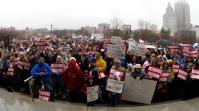 |
| Area Catholics gathered to protest on the steps of the State |
The spark that ignited a firestorm over a proposed bill that would change the way Roman Catholic churches are governed started with a flurry of phone calls and e-mails.
In the hours and days that followed, its intensity spread from parish to parish fanned by the state's Catholic bishops who used Web sites, videos, newspaper ads, church bulletins and messages from the pulpit. They warned their church was under siege and First Amendment rights in jeopardy. The faithful were told: today it is the Catholic church, who knows who is next.
The anger was apparent in the usually serene Bridgeport Bishop William E. Lori, who called proposed Senate Bill 1098 "irrational, unlawful and bigoted" and "a thinly veiled attempt to silence the
Church-finance reform bill creates a weeklong firestorm in Hartford. Catholic church.
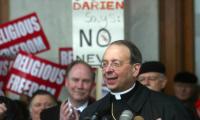 |
| Bridgeport Bishop William E. Lori speaks Wednesday to several. |
It was a harsh rebuke, but Lori, Hartford Archbishop Henry J. Mansell and Norwich Bishop Michael R. Cote knew it would take more than words to defeat the bill.
The bishops and parish priests quickly mobilized the faithful, urging them to call or e-mail legislators and attend the Judiciary Committee's public hearing on the bill. More than 50 buses were chartered, religious and constitutional experts recruited.
And in seven days of intense debate and heated words, the crusade to kill the bill was over. It died a simple death when the public hearing was cancelled.
Yet, Catholics did not want legislators to forget their outrage. Last Wednesday -- the day the public hearing was originally scheduled - 3,500 of the faithful descended on the state Capitol. The 40,000 who rallied at the Capitol against the income tax in 1991 formed a much larger crowd, but the 3,500 Catholics who made a vocal presence last week may have been the most passionate.
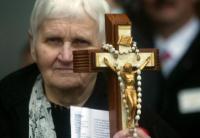 |
| During last Wednesday s rally in Hartford, a woman holds a... |
How the bill and the protest began
While the protest by thousands of state Catholics was quickly mobilized, Bill 1098 had a slower evolution, shepherded by a handful of people.
A passionate group of thousands were stirred up and organized last weekend by parish priests over a perceived threat to the authority of church hierarchy. The number who demonstrated, and subsequent testimony before a mostly Republican panel, was universally opposed to a law that would allow local congregations to elect seven to 13 members of local parish boards.
Currently two lay members are appointed to local boards by church leaders.
Bishop Lori, who serves on 87 parish boards in the Bridgeport Diocese, focused the attention of last Wednesday's noontime rally on two lawmakers, Sen. Andrew J. McDonald, D-Stamford, and Rep. Michael P. Lawlor, D-East Haven, the co-chairmen of the Judiciary Committee.
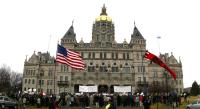 |
| Thousands of Roman Catholics made the trip to the State Capital in... |
At issue was a proposal by Tom Gallagher, a parishioner at St. Catherine of Siena Roman Catholic Church in Greenwich, who along with scholars such as Paul Lakeland, chairman of the Center for Catholic Studies at Fairfield University, believe that lay members deserve a greater say on church boards.
Backers of the bill believed the law would instill better control of church finances. The Rev. Michael Jude Fay, former pastor of St. John Church in Darien, was convicted in 2007 of stealing up to $1.4 million in parishioner donations and is currently serving a three-year prison term.
In Greenwich, the Rev. Michael Moynihan resigned in January 2007 from Greenwich's St. Michael the Archangel Church after a preliminary audit uncovered $500,000 in spending the church couldn't account for in its records.
The Bridgeport diocese said bookkeeping measures are already in place including finance councils and independent audits. Parishioners also have access to all financial reports and those who report improprieties are protected by a whistle-blower policy
As the controversy died down, McDonald said Friday that the complicated issue is best left to extensive research.
"Given the substantial and complex constitutional questions involved, the Legislature should do absolutely nothing until the attorney general has a chance to review the generations-old religious statutes on the books," McDonald said.
While the controversy emerged last weekend, the idea goes back several years, when Gallagher approached his local House member, then-Rep. Claudia Powers, R-Greenwich, who briefly pursued part of his agenda in 2007 before it died in the legislative process.
"He had written and asked me to put a bill in," Powers recalled last week. "What I ended up doing was doing a piece of it. It was one line written on a form filed upstairs" in the Legislative Commissioner's Office. "I never met Tom Gallagher, but he sent me a bunch of material. I wasn't interested in anything challenging the constitution."
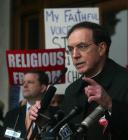 |
| Phil Noel/Staff photographer Archbishop Henry J. Mansell speaks to the crowd of Roman Catholics... |
For students of Connecticut law, the issue has a back-to-the-future quality in a political landscape where the perceived rules separate religious communities from any state control, including taxes.
In Connecticut's original 1866 state law on religious corporations, all church boards, including Roman Catholics, were elected by congregations.
A 1902 revision of the law retained congregational elections, but a year later, Bishop of Connecticut Michael Tierney asked Connecticut lawmakers to allow church leaders to appoint the two lay members on each parish board.
"After a long and varied experience both as pastor and bishop, I find that the clause in the charter bearing upon the election of trustees has proven ambiguous, capable of many interpretations and the source of numerous illegalities," Tierney wrote on March 24, 1903. It was published in the March 25, 1903 Hartford Courant, which printed the minutes and testimony of the General Assembly.
At the time, the legislation had been approved by the General Assembly, but had been recalled for further debate, amid complaints from French-American congregations that it was "un-American" because it would have concentrated power in the top church officials.
Fast forward to January 2007, when Gallagher published an op-ed piece in The Advocate of Stamford calling for an updating of the statute.
McDonald last week recalled that by the time he was contacted in 2007, it was past the legislative deadline for submitting legislation, but he said it would be in the hopper for 2008. "In January of '08, I met with Sen. McDonald and Rep. Lawlor," Michael Culhane, executive director of the Connecticut Catholic Conference, the public affairs arm of the church, recalled last week.
"It was very cordial and we discussed a number of issues and eventually Sen. McDonald raised the issue of revisiting corporate statutes regarding religious corporations." But in 2008, in the wake of the previous summer's triple murder of a mother and her three daughters in Cheshire, the Judiciary Committee was too focused on rewriting the state's persistent-offender laws.
Key Dates of the bill's creation and defeat
n DEC. 9, 2008: McDonald receives a package of information on the issue from Gallagher, whose resume includes having worked for the U.S. Catholic bishops conference.
n DEC. 23, 2008: McDonald e-mails a request to Gallagher to research instances of theft and financial mismanagement in Catholic parishes. "Before this arose, I had never heard of Tom Gallagher," McDonald said. "I didn't know he was a Republican or the height of his Catholic training and pedigree, but I found him to be very sincere, extraordinarily devoted and attuned to the legal issues that he has been advocating for so long."
n JAN. 9: Gallagher modifies the plan to separate the theological and fiduciary roles of parish boards.
n JAN 20: McDonald receives more information from Gallagher focusing on a "governance gap" in the current system.
n JAN. 23: the Judiciary Committee raises a "concept" for eventual public hearing on "An Act Modifying Corporate Forms."
n TUESDAY, MARCH 3: Lawlor, a veteran lawmaker who was in his third term during the volatile 1991 income-tax session of the Legislature, remembers talking with McDonald on March 2 or 3 about the legislation. "Andrew was describing it, saying the Catholic church has to do this and that and I said I'm not sure if that's a good idea," Lawlor said, admitting that he knew little about existing law on church organization. "I said I think it's going to start a little flap."
n WEDNESDAY, MARCH 4: Culhane, of the Catholic Conference, gets a "heads-up" phone call about the bill that was drawn up by the Legislative Commissioner's Office and included reducing the power of the bishops and priests.
n THURSDAY: MARCH 5: Culhane sees a written version of the bill. "Thursday morning we sent e-mail to the bishops with a copy of legislation, indicating we should meet immediately," Culhane said. By the afternoon he, Hartford Archbishop Mansell, Norwich Bishop Cote and Lori hold a teleconference to discuss strategy.
n FRIDAY, MARCH 6: the Judiciary Committee publishes its agenda for Wednesday, March 11, that includes a public hearing on the bill. By the time the bill was posted online, Lawlor is wondering about the whole constitutional issue of past, present and future laws regulating on religious groups. "How is all of this constitutional?" Lawlor said. "At the same moment, the stuff was hitting the fan." Catholic Conferences identifies expert witnesses to invite to the hearing. Lori summons parochial school principals to Bridgeport to inform them of the bill and plans to stop it from becoming law. He asked the principals and parish priests to recruit church members to go to Hartford to speak against the bill.
n WEEKEND OF MARCH 7, 8: Catholics across Connecticut informed of proposed law at Masses and urged to fight it through phone calls, e-mails and public protest in Hartford.
n MONDAY, MARCH 9: Opposition builds to proposed bill. Bridgeport Diocese continues organizing protest. Legislators Lawlor and MacDonald besieged by phone calls and e-mails. By 9:30 a.m. McDonald received 3,600 e-mails. "There was just an outcry the like of which I've not seen," Culhane said.
n TUESDAY, MARCH 10: Lakeland and Gallagher hold a news conference in which they asked that the legislation be tabled amid the controversy. Gallagher said he didn't agree with the part of the draft that would reduce the prominence of bishops and priests."My little idea was to simply add a few more lay trustees to the Catholic parish corporation board who would be permanent members on a multi-year basis," Gallagher told reporters. "By and large, the essence of that bill is good."
By noon, when McDonald and Lawlor cancelled the next day's hearing at the 24-hour deadline, Republican lawmakers said they'd go ahead with an information forum anyway for Catholics who had already booked buses to the Capitol for the next day.
"Fair's fair," Lawlor said of the Republican's seizure of the public-relations high ground. "It's all politics." McDonald and Lawlor said they should have rolled the bill out a different way.
"The Catholics' reaction was my reaction," Lawlor said. "How can we do this? But then you see we've been doing it for 150 years." McDonald and Lawlor agreed that the bill was simply a matter of responding to constituents.
"These guys are proposing boards of 7 to 13 members," Lawlor said. "I'm curious why five members is constitutional and 13 is not. I would just like to understand this a little better. My gut tells me we shouldn't have special laws for different religions. Apparently we're at the beginning of a very complicated discussion."
Lawmakers now await Attorney General Richard Blumenthal's opinion on the constitutionality of current law on religious corporations.
n WEDNESDAY, MARCH 11: With the bill dead, 3,500 Catholics turn a protest at the state Capitol into a celebration, warning the General Assembly to stay out of their churches.
AFTERMATH
In an commentary piece in Sunday's Connecticut Post, Lori writes: "The timing of this mean-spirited attack on the church comes at time when a severe recession is forcing Connecticut's state government to cut back on programs of all sorts. The church -- the largest private provider of social and educational services -- is taking up much of the slack. You'd think these legislators would see the importance of these services for the common good of society.
"There are lessons to be learned here. First, as believers and citizens, we need to remain alert. Religious freedom may have dodged a bullet, but the struggle isn't over. Other salvos are coming."
Any original material on these pages is copyright © BishopAccountability.org 2004. Reproduce freely with attribution.